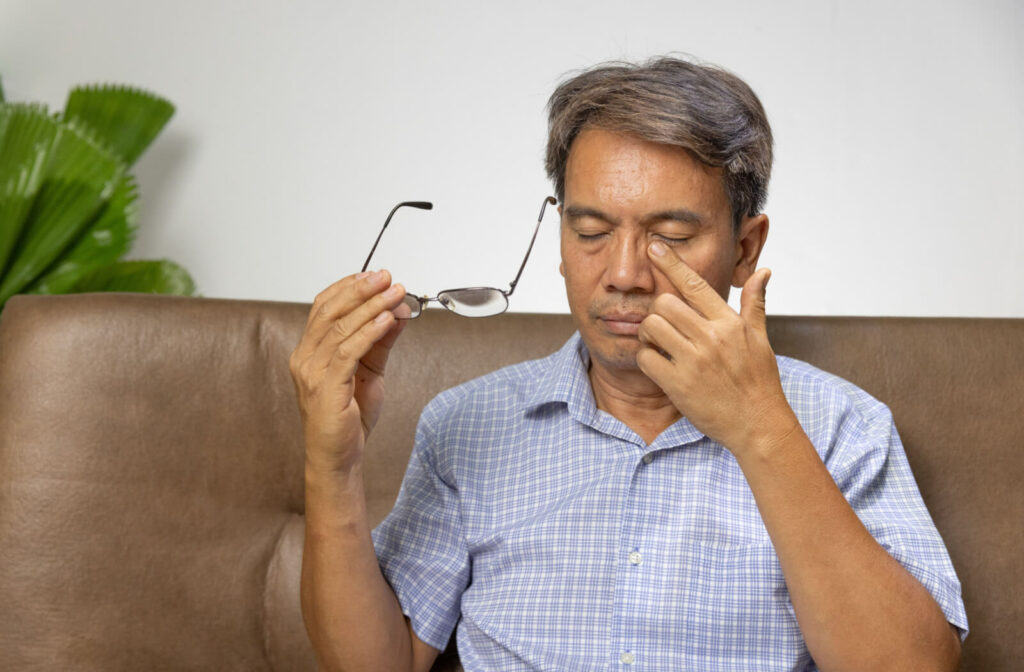Your vision plays an important role in your day-to-day life, and when you develop a problem with it, you may feel frustrated. Feelings of dry eye or light sensitivity can be irritating and detrimental to your daily activities, so how do you deal with them? Are they treatable?
Dry eyes and light sensitivity are commonly experienced by millions of people every year. Fortunately, this means they’re highly treatable, typically through the use of prescription eye drops or an updated prescription. However, these aren’t the only options—by visiting an optometrist, you can determine what’s causing your vision problems and build a treatment plan to solve them.
What Causes Dry Eye?
Dry eye syndrome is best characterized by a dry, burning, or gritty sensation on the surface of your eye, which can lead to irritation and discomfort. In some situations, it can lead to redness around the eye and even blurry vision. It’s a very common condition, affecting millions of people every year.
This condition is typically caused by an issue with your tear production. In a healthy eye, tears are naturally produced and dispersed evenly across the surface of your eye when you blink. These tears help hydrate and lubricate the eye while protecting it from external debris. These tears are made of three layers:
- The aqueous, or water, layer, which composes most of the tear. This helps lubricate the eye, protects it from dust and debris, and hydrates the eye tissue
- The lipid, or oil, layer. This helps prevent the tear from evaporating while keeping the surface smooth
- The mucin, or mucus, layer. This layer keeps the tear attached to the surface of the eye, maintains its smooth surface, and protects the eye from bacterial contamination
If the eye doesn’t produce enough tears or an issue develops with one of these three layers, it can lead to the development of dry eyes. However, this isn’t the only cause. Dry eye syndrome can also be caused by:
- Environmental factors, like too much dust in the air
- A particularly humid or dry environment
- Extended screen usage, which can cause you to blink less
- Medical conditions, like glaucoma or diabetic retinopathy
- Eye strain or fatigue
How to Treat Dry Eye
Fortunately, this common condition has several solutions available. If you believe you’re suffering from dry eye, your first step should be to visit your optometrist. They can perform a comprehensive eye exam and determine what may be causing your dry eye syndrome.
Typically, dry eye syndrome can be treated through the use of:
- Atropine eye drops or artificial tears
- Warm compresses or cleaning the eyes often
- IPL treatment designed to help with tear production
- Prescription medication
- Lifestyle or environmental changes
By addressing what’s causing your dry eyes, an optometrist may be able to slow or stop the condition and bring you some relief.
What Causes Light Sensitivity?
Light sensitivity, also known as photophobia, is a frustrating and irritating experience. However, it also appears in a wide range of severity, which can sometimes make it difficult to determine what’s causing this condition. Typically, this feels like most sources of light are too bright, causing the development of eye strain and fatigue in bright environments.
In some situations, this can be caused by prolonged screen usage or too much time spent at a computer. When your eyes spend too long focusing on something nearby, you often blink significantly less, which can make your eyes much more sensitive.
Light sensitivity can also be caused by certain eye conditions. Dry eye syndrome, digital eye strain, inflammation, or even a scratch or abrasion on the cornea can make your eye much more sensitive to light. It can also be caused by other medical conditions like migraines, trauma to the eyes, concussions, or even allergic reactions.
If you notice that your eyes are suddenly much more sensitive to light, it’s important to visit your optometrist so they can determine what may be causing this change.
How to Treat Light Sensitivity
Light sensitivity can be complex when it comes to making a treatment plan. Your first step should be to visit your optometrist so they can determine what’s causing it, which can allow them to design a treatment plan appropriate for your situation.
If they believe that your light sensitivity is being caused by too much screen usage, they may recommend tinted lenses or even blue light glasses to reduce the effects of the screen on your eyes. They may advise you to use a pair of UV-blocking sunglasses to reduce the amount of light entering your eyes when outside.
It also helps to adjust the lighting in your environment until your light sensitivity begins to recede. By modifying your environment with different light bulbs, blackout curtains, or even tinted window films, you can reduce the amount of light your eyes are exposed to.
If you spend a lot of time using screens or electronics, you should consider taking breaks every 20 minutes, as this may help alleviate some symptoms.
Avoiding sources of bright lights and identifying your triggers can be beneficial as well. While these vary from person to person, it typically helps to avoid sources of bright light and protect your eyes when outdoors.
Where to Get Help for Vision Problems
Vision problems like dry eye syndrome and light sensitivity can be detrimental to your day-to-day life, so it’s important to seek help from an experienced eye care professional. By visiting your optometrist, you can find what’s causing your vision problems and design a treatment plan to slow or stop the symptoms.
At Griffin Optometric Group, we know how important your vision is to your daily life. Schedule an appointment with us today to find relief from your dry eyes or light sensitivity.



